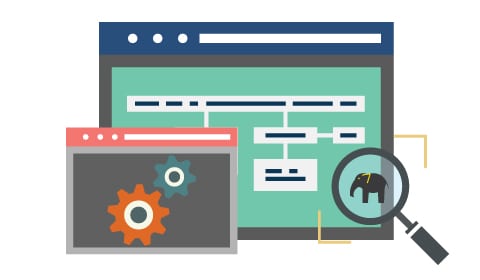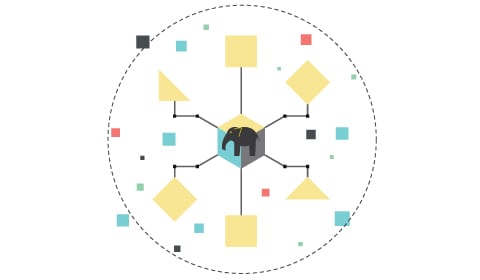Microsoft Azure Data Engineering Training Cou ...
- 15k Enrolled Learners
- Weekend
- Live Class
Most of us know the story of the woodcutter, who went to work for a timber merchant. His salary was based on the number of trees he could cut for the day. On the first day, he could cut 20 trees. Happy with the result, and even more motivated, he tried harder the next day and came back with 30 trees. However, his success was short-lived. After a week, the number of trees he was cutting was dwindling. “I must be losing my strength,” the woodcutter thought. He decided to go and see his boss and apologized for not living up to the expectations. He was taken aback, when his boss asked him,
“When did you last sharpen your axe?”
He replied, “I have been busy cutting more trees for you and I just did not have the time to sharpen my axe.”
Cut to modern world: I am sure many of us can relate to this story to some extent. What is crystal clear is this: the axe — or in today’s context, technology — needs to be upgraded constantly, without which progress is impossible.
Most of the companies today are waking up to the needs of technology across all domains and reaping the benefits. Let’s take the example of book retailers. Earlier, traditional booksellers in stores could easily track which books were popular and which were not, based on the number of those particular books sold. If there was a loyalty program, they could tie some of those purchases to individual customers. That was just it.
But once the focus was on online shopping, there has been a 360 degree turnaround in understanding customers. Online retailers — the biggest example being Amazon — were able to track not only what customers bought, but also their viewing history; how did they navigate; how did the reviews, page layout and promotions influence them. They even came up with algorithms to predict which book a particular customer would love to read next. Booksellers in physical stores just could not have this kind of information.
No prizes for guessing why Amazon pushed several bookstores out of business. It is evident that it tapped in to the need to manage its volumes of customer data that was being overlooked by the traditional booksellers.
This is where big data comes into the picture. The hype surrounding big data is not just hype. We now live in a world that is dominated by big data, whether we accept the fact or not. The amount of data doubling every day across the world is undeniable. Pat Gelsinger, the CEO of VMware, has rightly said, “Data is the new science. Big data holds the answers.” Using that data effectively is the crux of the matter.
Companies like Facebook and Twitter have been efficiently using big data for quite some time now. Today, organizations across all domains whether big MNCs or startups — be it social media or health care or finance or airlines — are embracing the big data wave and are investing big time in it. The domino effect of these upgrades and new initiatives are bringing in a lot of changes in job titles and job roles.
But the big question is: Are professionals ready to upgrade to the latest technology and take up new challenges? Shifting to big data is imperative, as it touches nearly every aspect of our lives, whether we realize it or not.
Technology moves at a very fast pace. And, if a Java professional is still fiddling with Java 1.3 code, he needs to look past and upgrade to the most up-to-date technology. Big data and Hadoop are synonymous. Going by the demand and the growing popularity, Hadoop, an open-source — Java-based programming structure — rules the market today. International Data Corporation predicts that the big data and Hadoop market worldwide will hit the $23.8 billion mark by 2016.

Is it prudent for a Software testing professional to jump the Hadoop bandwagon? The answer, I am sure, will be ‘yes’ for many. A testing professional’s job, which entails ironing out bugs and improving the quality of the finished product, can get monotonous at times. He may feel stuck in the rut after a point doing the same kind of work day in and day out. This is when the need to upgrade his skills to big data and Hadoop can come in handy. His realm of opportunities will also open up.

Even a mainframe professional’s work involves bulk data processing. And, handling volumes of unstructured data can be time consuming besides getting monotonous. Take the case of a person, who is involved in census data processing in mainframe. His job includes monitoring and collecting questionnaires, checking, data entry, storage, tabulation etc. This can get mind boggling, right? The process is not only time consuming, but also expensive. Hadoop being an open-source platform can be the most viable alternative to manage volumes of data for him. With Hadoop he will also have better career opportunities that are increasing by the day.

What about the data warehousing professional and the ETL developer, who handle loads and loads of data? Given the enormous flow of data today, they get so caught up in this data that their work is restricted to just handling the flow of data. But by upgrading to Hadoop, these professionals can effortlessly handle volumes of data. Also, how can they forget the big opportunities in the data management sector?

There is also the Business Intelligence professional whose challenge lies in storing Big Data. For example, in an advertising agency, he will constantly need answers to analytic questions, such as: What drives people to certain content? What’s their profile? How do we draw more people to an area? It is only with the help of Hadoop that he can scale up and deliver good answers frequently.

Whether you are a Java professional or a software testing engineer or business intelligence professional, there is no debating the fact that big data technologies are becoming a common accompaniment. Therefore, you need to look beyond and upgrade to the challenges of big data technologies. Lest, you become like the woodcutter who was so busy felling trees that he forgot to sharpen his axe.
Is your profession/doma
If you also want to learn Big data and make your career in it then I would suggest you must take up the following Big Data Architect Certification.
Got a question for us? Mention them in the comments section and we will get back to you.
Related Posts:
All You Need to Know About Hadoop
 Thank you for registering Join Edureka Meetup community for 100+ Free Webinars each month JOIN MEETUP GROUP
Thank you for registering Join Edureka Meetup community for 100+ Free Webinars each month JOIN MEETUP GROUPedureka.co
Hi I am working as a data center operator and having knowledge on Sql can i go with Big data and Hadoop
Hi Rachel, a lot of people are now moving from SQL to NoSQL as the Big Data is evolving. You will get ot know the flavor of SQL in Hadoop training, with HBase. The only prerequisite for learning Hadoop is Core Java. We provide a complimentary course ‘ Comprehensive Java’, which will help you pick up the essential Java knowledge required to learn MapReduce concepts in Hadoop. You can go through our website for more information: https://www.edureka.co/big-data-hadoop-training-certification You can also call us at US: 1800 275 9730 (Toll Free) or India: +91 88808 62004 to discuss about this in detail.
Hi, I have worked mainly in Microsoft technologies and currently interested in seeking career in Hadoop. I have almost 7 years of experience in IT, development, support and maintenance in Microsoft technology. I can learn core Java, but J2EE etc may take time. Is Hadoop right path for me? Please advise
Absolutely Patrick!! You can learn Hadoop. The only pre-requisite to learn Hadoop is to have knowledge in Core Java and not advanced Java/J2EE. We provide a complimentary course ‘ Comprehensive Java’, which will help you pick up the essential Java knowledge required to learn MapReduce concepts in Hadoop. You can go through our website for more information: https://www.edureka.co/big-data-hadoop-training-certification You can also call us at US: 1800 275 9730 (Toll Free) or India: +91 88808 62004 to discuss about this in detail.
i am final year(B.E) computer science and engg student
i have basic knowledge about big data and hadoop
i want to make my future in hadoop and big data
my question is
after doing your course will i get a job ?(as fresher)
Hi Sourabh, a lot of companies are looking for freshers in Big Data space. The only pre-requisite is knowledge in core Java. What we are seeing as of now is just a start and there is a lot of potential for professionals who will be the early movers in Big Data space. Read more about the future prospects of Big Data here: https://www.edureka.co/blog/big-prospects-for-big-data/
You can find course information at https://www.edureka.co/big-data-hadoop-training-certification. You can call us at US: 1800 275 9730 (Toll Free) or India: +91 88808 62004 to discuss in detail.
Hi
I am a pl/sql developer and interested in learning Hadoop. Can anyone suggest me , whether it is a wise move and how difficult it would be for me to learn hadoop as i heard one needs to have atleast core java exp for learning hadoop.
Thanks
Hi Mani, Big Data/Hadoop is the most in-demand technology these days, while most of the big companies Big Data as a part of their root strategy. Mani, only knowledge in Core Java is necessary and not experience. A complementary course of Java, ‘Comprehensive Java’ is provided along with ‘Big Data and Hadoop’ course. This will help you brush up on your Java knowledge necessary for learning MapReduce concepts in Hadoop.
You can call us at US: 1800 275 9730 (Toll Free) or India: +91 88808 62004 to discuss about this in detail.
I am SAP BI Consultant. I am currently in USA to persue my master’s. This is my last semester. I am seeing very job oppurtunities for SAP BW consultants in USA. I need your advice, should I drop my current skills SAP BI and go for Hadoop Developer?
Hi Md, Big Data/Hadoop is the most in-demand technology these days, while most of the big companies Big Data as a part of their root strategy. This is the reason why most IT professionals are taking up Hadoop. Professionals from BI/DW domain focus more on Pig/Hive component of the Hadoop framework. Your current knowledge in BI will not go in vain and you will learn the latest technology Hadoop, which is if immense value.
Hope this helps!!
Hi,,,I am BCA graduate-2008, I am working in SMS/eMail Marketing Company as Data Analyst. I want to switch my career to Hadoop Technology.
I am working in MS SQL Server, writing some basic Queries,Stored procedure, Functions & Maintaining Database in MS SQL Server 2008/12 R2. I have learned java in college only.
Can I learn Hadoop?. I would like to settle my Career in Hadoop Technology. Please guide me correct path.
Hi Sunil, the only pre-requisite for learning Hadoop is knowledge in Java. Since you already know Java it will be really easy for you to grasp various concepts in Hadoop. Sunil, what we are seeing as of now is just a start and there is a lot of potential for professionals who will be the early movers in Big Data space. For more information regarding the prospect of Big Data and Hadoop, refer to this link: https://www.edureka.co/blog/big-prospects-for-big-data/
Please visit this link for more information https://www.edureka.co/big-data-hadoop-training-certification You can call us at US: 1800 275 9730 (Toll Free) or India: +91 88808 62004 to discuss in detail or write to us at sales@edureka.co.
hi i am working in java for past 5 years,will it good for me to learn hadoop .Will i get a good job after it.Will it be a risk for me to switch technology.Can i get a job with out working on any big data project ?Please answer
Hi Vaibhav, the only pre-requisite for learning Hadoop is knowledge in Java. Since you already know Java it will be really easy for you to grasp various concepts in Hadoop. What we are seeing as of now is just a start and there is a lot of potential for professionals who will be the early movers in Big Data space. Hadoop is a relatively new field, and professionals with experience like you are updating themselves with Hadoop for better career opportunities. The Hadoop certification program provides you the hands-on experience that is essential. You will be working on projects where you will be performing Big Data Analytics using Map Reduce, Pig, Hive & HBase. You will get practical exposure about Data Loading techniques in Hadoop using Flume and SQOOP. You will understand how Oozie is used to schedule and manage Hadoop Jobs. You will also understand how the Hadoop Project environment is setup and how the Test environment is setup. All this exposure and hands-on approach will provide you the necessary experience.
For more information regarding the prospect of Big Data and Hadoop, refer to this link: https://www.edureka.co/blog/big-prospects-for-big-data/ Please visit this link for more information https://www.edureka.co/big-data-hadoop-training-certification You can call us at US: 1800 275 9730 (Toll Free) or India: +91 88808 62004 to discuss in detail or write to us at sales@edureka.co.
I am from System Administration background trouble shooting application for clients,can i take up hadoop
Absolutely Sam!! A lot of professionals from admin background prefer taking Hadoop Administration course. It is like a natural progression. There is no pre-requisite of any programming language; however exposure to basic Linux fundamental commands will be beneficial. Please visit this link for more information: https://www.edureka.co/hadoop-administration-training-certification You can call us at US: 1800 275 9730 (Toll Free) or India: +91 88808 62004 to discuss in detail.
I am a marketing & Business analyst….. how relevant it is to me…..
A lot of professionals from marketing side consider learning ‘Business Analytics with R’ course. You can read more about why Marketing professionals should go for R, here: https://www.edureka.co/blog/r-for-marketing-professionals/
I have passed out in 2014 . I know core Java . Now I should start my career with java or PHP ? Or I should learn hadoop ?